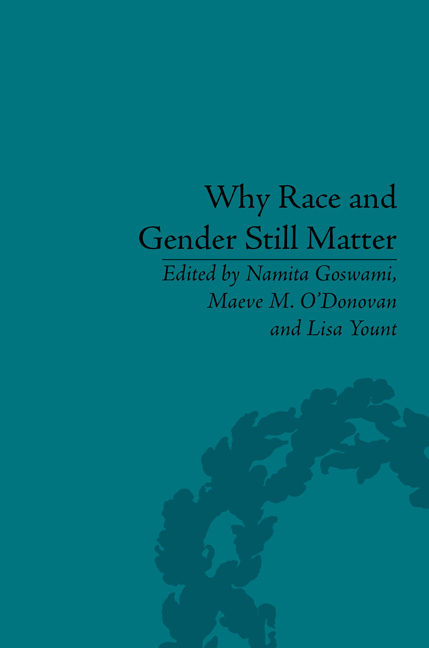Book contents
- Frontmatter
- CONTENTS
- Dedication
- Acknowledgements
- List of Contributors
- Introduction to Why Race and Gender Still Matter: An Intersectional Analysis
- Part I Defining Intersectionality
- 1 Race Women, Race Men and Early Expressions of Proto-Intersectionality, 1830s–1930s
- 2 Past as Prologue: Intersectional Analysis from the Nineteenth Century to the Twenty-First
- 3 Making Sense: The Multistability of Oppression and the Importance of Intersectionality
- 4 Reinvigorating Intersectionality as a Provisional Concept
- 5 ‘Big Red Sun Blues’: Intersectionality, Temporality and the Police Order of Identity Politics
- Part II Doing Intersectionality
- Notes
- Index
5 - ‘Big Red Sun Blues’: Intersectionality, Temporality and the Police Order of Identity Politics
from Part I - Defining Intersectionality
- Frontmatter
- CONTENTS
- Dedication
- Acknowledgements
- List of Contributors
- Introduction to Why Race and Gender Still Matter: An Intersectional Analysis
- Part I Defining Intersectionality
- 1 Race Women, Race Men and Early Expressions of Proto-Intersectionality, 1830s–1930s
- 2 Past as Prologue: Intersectional Analysis from the Nineteenth Century to the Twenty-First
- 3 Making Sense: The Multistability of Oppression and the Importance of Intersectionality
- 4 Reinvigorating Intersectionality as a Provisional Concept
- 5 ‘Big Red Sun Blues’: Intersectionality, Temporality and the Police Order of Identity Politics
- Part II Doing Intersectionality
- Notes
- Index
Summary
it is not who [we are], but what [we] … know and what [we are] prepar[ed] to do about what [we] know that [is] going to make [us] free at last
I
A flick of a switch is all it takes. After which, nothing will ever be quite the same again. And yet, even if it is never the same as before, it too will become habitual, it will come to constitute part of the commonsensical way of seeing things. None of us is immune. I've seen it happen. I've been part of it. I've been assimilated into the police order. So have you. The police order is how we think, how we make sense of the world, what constitutes itself as common sense. First there was sexism. Then there was feminism. Feminism became part of the police order insofar as it started policing who could, and who could not, count as a woman. Then there was the transgender movement, and feminists found themselves having to rethink why certain body parts had somehow become essential to what it meant to be a woman, and who had the right to determine which body parts qualified and in what ways, and how feminism's policing of bodies reflected the very order of thought it was trying to escape.
- Type
- Chapter
- Information
- Why Race and Gender Still MatterAn Intersectional Approach, pp. 71 - 86Publisher: Pickering & ChattoFirst published in: 2014



